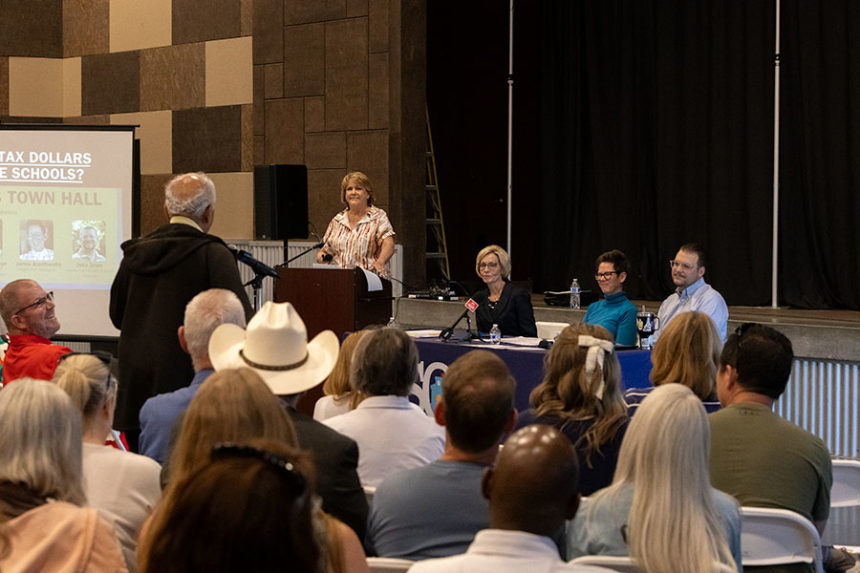IDAHO GOES DOWN On Tuesday afternoon, hundreds of community residents, educators, and activists convened at the Waterfront to listen to stakeholders’ concerns on the use of public funds for private education.
This relates to House Bill 93, which Governor Brad Little signed on February 27 and is also known as the Idaho Parental Tax Credit and Idaho Parental Choice Tax Credit Advance Payment fund. The bill will offer tax credits totaling $50 million for tuition at private schools.
Idaho PTA President Jamie Braithwaite, Idaho Falls Middle School Teacher Jake Snarr, and Idaho Falls School District 91 Superintendent Karla LaOrange attended the town hall, which was organized by Save Our Schools Idaho.
Save Our Schools Idaho is an educational organization that seeks to inform voters about HB 93 and other initiatives that defund public schools, according to its website.
According to the group’s literature, lawmakers in Idaho may increase the $50 million budget to $339 million in the upcoming year, raising concerns about how HB 93 will be executed.
According to LaOrange, every kid in Idaho has the right to an education, irrespective of their background, language, or financial situation.
According to LaOrange, public education is the cornerstone of democracy. Does it make a difference in Idaho if we don’t have intelligent voters with the minds needed to solve problems, innovate businesses, and create future generations of leaders?
History of HB 93
- Co-sponsored by Rep. Wendy Horman, R-Idaho Falls, and Senate Majority Leader Lori Den Hartog, R-Meridian, in the 2025 Legislative Session.
- Passes the Idaho House 42-28, and the Senate 20-15.
-
President Donald Trump
weighs in on the bill on Truth Social
on Feb. 16, saying, $50 Million Dollars to empower parents to provide the very best Education for their child GREAT news for Idaho families. This Bill, which has my Complete and Total Support, MUST PASS!
- The bill is delivered to Gov. Brad Little s desk on Feb. 21.
- Little sets up a hotline to get public feedback on the bill and receives a thousands of calls. Among more than 37,000 residents, over 86% ask that the governor veto the bill. Just over 5,000 calls and emails side with Little signing it into law.
- Little signs the bill on Feb. 27.
-
Legislature introduces two private school choice bills
-
Complete and total support : President Trump weighs in on this Idaho bill proposal
-
Private education tax credit heads to governor
-
Thousands of phone calls flood governor s desk as school choice bill awaits his decision
-
How many people asked Gov. Little to veto Idaho school choice? Here are the latest numbers
-
Gov. Little issues decision on Trump-endorsed school choice bill
-
The bill itself
An issue LaOrange’s opposition to HB 93 was caused by a number of instances when initiatives to privatize Idaho’s education system and invest in outside organizations were financed by funds from national organizations outside of Idaho.
She claimed that her daughter, a teacher in Arizona, where a bill of that kind was passed, has witnessed the consequences of public education privatization and the financial burden it has placed on taxpayers. According to LaOrange, that decision has increased to $800 million in a matter of years, depriving public schools of funding.
LaOrange stated that she was concerned about the fact that only 8% of Arizona’s students attend private schools after learning about the state’s predicament.
According to LaOrange, the great majority in Arizona are bearing the consequences of the few who are using vouchers.
Ninety-four percent of Idaho students attend some kind of public school, while six percent attend private schools, according to Jaime Braithwaite, president of the Idaho Parent-Teacher Association.
In her interview with Little, she stated that she was told that a 4% to 6% reduction in spending is required for the upcoming year because of a shortage.
According to Braithwaite, HB 93 deprives our public schools of vital resources at a time when they are more in need of assistance than ever.
RELATED | Little advises education leaders and organizations to get ready for potential budget cuts
Discretionary funds were cut during the last legislative session, according to Snarr. Schools can use discretionary funds to distribute money according to their goals and needs.
According to Snarr, expanding the voucher program would put the state’s capacity to catch up on important funding or district needs at risk. Public school districts will increasingly rely on additional levies as public money are taken away from public schools.
According to Snarr, these outside organizations want to cannibalize public education to the extent that it becomes a talking point for the government’s shortcomings.
Since there is no assurance that these private schools will deliver on their commitment to give pupils an education, he was concerned about how the state would be able to hold them responsible. According to Snarr, public schools would have to pick up the pieces as a result.
LaOrange expressed similar worry, pointing out that HB 93 exempts private school leadership from testing, auditing, and transparency requirements. A parent satisfaction survey is the sole way to gauge achievement for individuals who get the tax credit.
A public school is not a company. Profit is not our goal. Making money is not our goal. According to LaOrange, “We are in the business of your children, helping them grow and become their best every single day.”
Sens. Dave Lent, R-Idaho Falls, and Kevin Cook, R-Idaho Falls, joined Reps. Stephanie Mickelsen, R-Idaho Falls, Marco Erickson, R-Idaho Falls, and Ben Fuhriman, R-Shelley, who each explained why they voted against HB 93.
Legislators were concerned that outside organizations were inflating a non-issue into partisan politics in Idaho.
According to Lent, these outside organizations invest millions of dollars in political advertisements to make sure that people who oppose these kinds of laws fear losing their seats and are urged to back their rivals.
You will receive flyers in the mail this year that give the impression that we are bringing in workers from Mexico to fill our positions. “They do that for a very specific reason, and that is to knock us out,” Lent added, “but it’s not even close to what’s happening.”
Lent is worried that people who gain from this measure will get between $5,000 and $7,500 and be asked if they are satisfied. He added that they will say that they are.
Cook claimed that he was worried about how he would explain to his voters where the money was going and how it was being utilized, and that he couldn’t provide an answer.
As a member of the Joint-Financial Appropriations Committee, he stated that the funds allocated for HB 93 are not visible to the committee, the governor, or the agencies submitting their budgets for the upcoming fiscal year.
As Little informed Braithwaite, he stated that the $50 million would not be impacted by the 4%–6% budget cut. This implies that there will be a larger cut in the future in addition to the $50 million that vanished for agencies and schools.
That’s gone already. It’s gone. “There’s no way we can do anything with that,” Cook stated.











